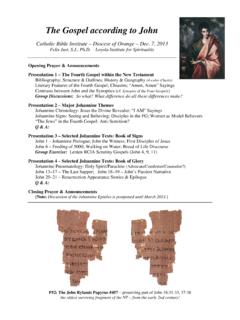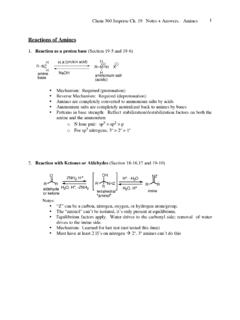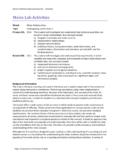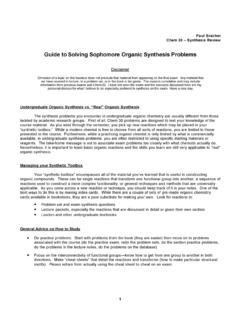Transcription of Handout 1 spell.strategies - VALBEC
1 Handout 1 Spelling strategies Sue Paull DVLC2004 Spelling StrategiesYou want to write a word you are not sure how to spell .. what do you do ?1. I leave a space and fix it up later. yes / no2. I write the first letter and then leave a space. yes / no3. I try to write the word, underline it and check it later. yes / no4. I try to sound the word out. yes / no5. I write the word a few different ways on a piece of paper and choose the one which looks correct. yes / no6. I ask someone. yes / no7. I look to see if the word is written anywhere. yes / no8. I look in the dictionary. yes / no9.
2 I use another word instead. yes / no10. I try to think of other words that rhyme with it. yes / no11. I remember a rule or a clue. yes / no12. What else do you do?.. Handout 2 Spelling Discussion Sue Paull DVLC 2004 How important is spelling ?Larst sataday when I was shoping I notised a group of people torking about asine in a window. The sine had a number of spelling thepeople were shakeing there heads in What do you think about the piece of writing above ? Did you find it easy to read ? How intelligent or educated do you think the writer is ? On a scale of 1 to 10, how important do you consider perfect spelling ? How do you feel when someone spots a spelling mistake in your writing ?_____LanguageSpeakingListeningReadingBo dy languageHand gesturesFacial expressionsWritingKnowledge ofstyles & formatsGrammarPunctuationHandwritingTypi ngSpellingUse of capitalsSpelling is only one part of the writing process,which in turn is only one part of language 3 Word origins Sue Paull DVLC 2004 Words more recently EnglishCut up :FrenchJapanese Spanish AustralianAboriginalLanguagesGermanRussi anchefsushisiestaboomerang blitzvodkaboutiquejudopatiobunyipwaltzsp utnikchampagne kimonoguitarkangarookindergartenrestaura nt kamikaze matador didgeridoohamburgerAdapted from : Spelling Works by & , Heinemann1996 Handout 4 Words with ch - 1 - Sue Paull DVLC 2004 Words with chCh is found in the English language, but it is also found in the Greekand French languages.
3 When English borrows words with ch fromGreek or French, the words have the Greek and French words below all have ch in them. Read the words aloud and decideif the ch has an English, Greek or French pronunciation. Write thewords in the correct chain scholarship mechanicchassis chemical Chinese achechauvinistic reach chandelier charactertechnical chatterbox itchy charmingchamois archives chocoholic charismaticchalet chewy architect chaperonechampion chaotic retrenched machinechronic cholera chisel chemotherapychoice chief cheeky achievecrochet child mechanic cheapThe Englishpronunciation ishard.
4 It s found inwords like chipsand Greekpronunciation is a ksound. It s found inwords like chemistand Frenchpronunciation is asoft sh sound. It sfound in words likechef 4 Words with ch - 2 - Sue Paull DVLC 2004 Words to be cut upand sorted accordingto the sound of chEnglishbranchchainChinesereachchatterb oxitchycharmingchocoholicchewychampionre trenchedchiselchoicechiefcheekyachievech ildcheapGreekmechanicchemicalcharacterte chnicalarchivescharismaticarchitectchaot icchroniccholerachemotherapymechanicache scholarshipFrenchchassismachinecrochetch andelierchauvinisticchamoischaperonechal etHandout 5 Memory & Learning - 1 - Sue Paull DVLC 2004 Memory and LearningMemory and learning are part of the same process. If we understand alittle more about them both, our learning can our brain worksThe brain is divided into two halves.
5 In Western society, each halfprocesses information in different ways. The right brain responds toemotion, art, music and patterns and grasps the whole picture quitequickly. The left brain tends to take in information in stages and ina logical sequence. To maximise memory and learning, we need to tryand involve both sides of the brain learning to spell to musicmight be a good idea ! language music logicpictures pictures sequenceart art analysis imagesMost of us are under using our brain s learning potential. To develop itwe need to use it. So the more facts and experiences we store up,the more associations and connections we can make. This will makethe learning and remembering of new material easier because we havemore pegs to hang the information on.
6 Because of this, adults are ableto relate new information to existing knowledge more effectively thanchildren and so can learn a wider range of things to popular belief, the brain does not start to decline after age25. Research suggests that the complexities of the brain start toimprove as you get older if you use brainRight brainHandout 5 Memory & Learning - 2 - Sue Paull DVLC 2004 Two kinds of Memory 1. Working memoryWorking memory is often referred to as your short term memory. It holdsinformation only for the brief time you need it to do something, such as tomake a decision to cross a road. It has been described as electrical average, the short term memory can handle between 5 and 9 units ofinformation at once. If all the short term memory space is used up, then anyadditional information will simply push the first piece out. Items stored in shortterm memory space can vary in length from single letters to single words towhole pieces of short term memory has severe limitations on its capacity to store things,so it helps if people chunk their information.
7 If the spelling of a twelve letterword is being learned, then it may be best learned in chunks rather thanseparate : d i s t r i b u t i o nbecomes dis - tri - bu - tion2. Long term memoryLong term memory has been described as chemical and permanent. It holdseverything that you know and which makes you the person you are. You areunlikely to forget anything that is in it, although recalling information mayprove difficult you want to hold onto something for future use, you have to transfer it fromyour short term memory into your long term memory. This will only comeabout if you make it happen and this is particularly so with spelling. Justbecause you have seen a word and copied it down once does not mean it isyours. You won t own that word to use it when you want, unless you learn it.[Adapted from The Spelling Pack ALBSU London 91] Handout 5 Memory & Learning - 3 - Sue Paull DVLC 2004 Quiz - Memory and Learning True False1.
8 The brain is divided into two The right brain responds to music and The left brain responds to To learn better, we need to involve both sides of the The more we learn, the less room we have in our Adults can learn a wider range of information than The brain begins to go downhill after age Your short term memory can hold 12 units of information at You are unlikely to forget anything in your long term Information usually goes automatically from your short term to your long term 6 Systematic revision Sue Paull DVLC 2004 How do you remember?Try answering the following questions and then think what your answers tellyou about how you remember things. Do people remember in different ways?Compare your responses with others in the do you :1. Remember a phone number after you look it up, until you dial it?
9 2. Recall the colour of your lounge room carpet?3. Remember someone s name after you have been introduced to them?4. Remember where you left your car in a very large car Remember what a rose in bloom is like?6. Remember a new piece of information you have just read?7. Remember a journey that you make quite regularly?Systematic RevisionTo be able to recall whatever you have learnt, it has to get into your long termmemory. Information gets there through practise. We hardly ever learnsomething by paying attention to it once or twice. If you want to get a wordinto your long term memory you need to:1. Look carefully at the word and work out what might help you remember it. Break it into syllables. eg: con cen trate Focus on the difficult part and write this part larger eg: special friend Write the difficult part in colour. Mispronounce the word. eg: Wed / nes /day Sound the silent letters.
10 Eg: comb Make links with similar words. eg: a piece of pie2. Using the Look Say Cover Write Check method,practise the word three times3. Practise again 1 hour later, six hours later, one day later, two days later, one week The word will now be in your long term time you use the word in your writing, it strengthens in your longtem memory and improves recall for the next time you need from: The Spelling Pack ALBSUH andout 7 Handwriting Sue Paull DVLV 2004 The importance of handwriting in learning to spellThe motor aspect of spelling is handwriting. The motor memoryor muscle memory is one of our strongest memories. Once a motorskill is learned, for example, bike riding, it is very difficult to is one reason why consistently misspelled words are difficultto a writer prints, the letters are isolated and the hand hasno memory for how it feels to produce certain patterns of joined writing however, each word has its own a distinctiverhythm and the chance of remembering a word is increasedbecause both the visual and motor memory are being people continue to print because they have done it for so longand feel it is too difficult to change.







